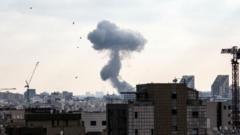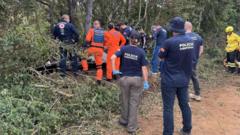In the wake of the U.S. attack on Iranian nuclear sites amid an escalating conflict with Israel, Iranians are experiencing profound shock and anxiety. With significant casualties reported and many fleeing to safer areas, citizens voice concerns about the future, particularly regarding essential resources like food and water.
Iranians Grapple with Shock and Fear Following U.S. Attack on Nuclear Sites

Iranians Grapple with Shock and Fear Following U.S. Attack on Nuclear Sites
The recent U.S. strikes against Iran's nuclear facilities have left the nation in turmoil, with citizens expressing fear and uncertainty as the conflict escalates.
The ongoing conflict between Israel and Iran has taken a dramatic turn as the United States engages with direct military action, targeting three of Iran's nuclear facilities. In an environment already marked by violence and disruption, the latest developments have struck fear into the hearts of millions of Iranians. With official reports indicating over 400 deaths and more than 3,000 injuries, many citizens are now grappling with an uncertain future.
In a series of phone interviews, individuals across Iran have shared their immediate reactions. A business executive, who chose to remain anonymous for fear of government repercussions, described the shock that permeates through society: “We’re all in shock — none of us expected that, within six or seven days, we'd reach this point.” Reflecting on personal experiences, he detailed his desperate escape from Tehran after a missile struck near him, now sheltering with extended family in northern Iran. His top priority remains the safety of his 9-year-old daughter, as he fears impending shortages of basic necessities such as food and water.
Sunday's news of the American attacks was met with a wave of sorrow, anger, and a sense of helplessness. Many Iranians are coming to terms with the harrowing reality of their situation, as civilians witness the deteriorating conditions on the ground. This conflict has disrupted the lives of Iran's 90 million people, igniting concerns over both physical safety and the future security of their families.
As Iranians navigate through this unprecedented crisis, their stories emphasize the human cost of international politics and military decisions. The nation stands at a crossroads as the outlook appears grim, marked by rising tensions and the ongoing fallout from military engagements.























